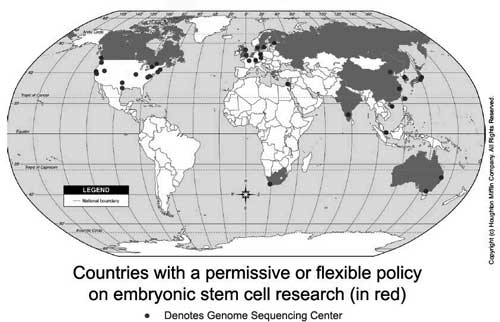
Independent
Voter Support for Ending Bush Limits on Stem Cell Lines
is Strong
Two out
of three voters in 18 key states support overriding the Bush
administration's limits on federal government funding for
stem cell research, according to a new survey conducted by
Peter D. Hart Research Associates on behalf of the Results
for America (RFA) project of the Civil Society Institute. The
survey also shows that a crucial bloc—independent voters—support
funding for stem cells over and above the Bush restrictions
by a wide 58-point margin (70 percent to 12 percent).
The 18 states covered in the RFA survey are Ohio,
Michigan, Pennsylvania, Maine, New Hampshire, Wisconsin, Minnesota,
Iowa, Washington, Oregon, New Mexico, Nevada, Arizona, Florida,
Louisiana, Arkansas, Missouri and West Virginia.
In August 2001, the Bush administration established
a new restriction on federal funding for embryonic stem cell
research. The restriction means that research on stem cell
lines created before August 2001 can receive funding, but funding
is prohibited for research on stem cell lines developed after
that date. The new survey results show that voters overwhelmingly
oppose this restriction and favor funding for research using
newer stem cell lines. Fully 65 percent of voters support expanding
federal government funding for stem cell lines created after
August 2001, including 50 percent who feel strongly, compared
with only 17 percent who support maintaining the Bush administration's
August 2001 restrictions.
Civil Society
Institute President Pam Solo said: “Stem
cell research is something that Americans want to see advanced
in an ethical and expeditious manner, using fertilized eggs
from fertility clinics destined to be discarded for research.
Hundreds of millions of Americans are touched directly or indirectly
by chronic illnesses and physical conditions that could be
cured or treated more effectively as a result of embryonic
stem cell research. The vast majority of Americans, regardless
of religious affiliation or political party, understand the
need for moving ahead with stem cell research. As a student
of theology and the parent of a child with Type 1 diabetes,
I find these survey findings to be hopeful both on moral grounds
and in terms of the prospects for life-saving research.”
Nearly all
voters have a personal connection to the issue. More than
two-thirds (68 percent) have some experience with cancer,
and more than half (58 percent) have been affected by heart
disease. Aside from these two more widespread diseases, 49
percent of voters report having a close personal friend or
family member who has suffered from Alzheimer's disease,
Parkinson's disease, juvenile diabetes, or spinal cord injury—and
thus could be affected by medical research on stem cells. Almost
nine out of 10 voters (86 percent) report having a family member
or close friend who potentially could benefit from stem cell
research.
Voters strongly support federal funding for medical
research. Even when compared with other items such as national
defense, transportation, or education, 59 percent of voters
say that federal funding for medical research should be a high
priority, including 31 percent who say that it should be a
very high priority. Another 35 percent say that funding for
medical research should be a moderate priority. Just 6 percent
do not see medical research funding as a priority for the federal
government. Support is higher among Democrats (64 percent)
than among Republicans (46 percent), and is highest among the
politically important independents (67 percent).
Independents strongly favor stem cell research.
Democrats and Republicans tend to have different views on embryonic
stem cell research in general. Democrats favor stem cell research
by a 46-point margin (65 percent to 19 percent), whereas Republicans
oppose stem cell research by a narrower nine-point margin (47
percent to 38 percent). However, independents have a view that
is much closer to that of Democrats than Republicans. Independent
voters favor stem cell research by a 32-point margin (55 percent
to 23 percent).
Support
grows with more information. Support for embryonic stem cell
research increases 13 percentage points to 66 percent when
people are informed that couples are donating unwanted embryos
that otherwise would be discarded. After hearing a more detailed
description of embryonic stem cell research and the diseases
it can help cure, support grows even more. Overall, three
in four (76 percent) voters support stem cell research after
hearing the following description: “Embryonic
stem cells are special cells that can develop into every type
of cell in the human body. The stem cells are extracted from
frozen embryos in fertility clinics, donated by couples that
no longer want or need the embryo. This process destroys the
embryo. These stem cells can then reproduce on their own, creating
what is called a ‘line' of stem cells that many researchers
can work with. Scientists believe that there is a good chance
that stem cells can be developed into cures or treatments for
diseases such as cancer, Parkinson's, Alzheimer's, juvenile
diabetes, and spinal cord injuries.”
Arguments for expanded stem cell research are more
persuasive than the arguments against it. Two-thirds (65 percent)
of voters agree that our government should support rather than
stand in the way of research that will help ease the suffering
of more than 100 million Americans who are suffering from Alzheimer's,
Parkinson's and other diseases and conditions. A similar level
of (63 percent) of voters are convinced by the argument that
if embryos that donors no longer need are not used for research,
fertility clinics will simply discard them with no benefit
to medical research. An equal proportion find the support of
the American Medical Association, the National Academy of Science,
National Institutes of Health, the Juvenile Diabetes Research
Foundation and the Alzheimer's Association of research on new
stem cell lines a convincing reason to lift the August 2001
restrictions on federal funding.#
Full survey findings are available online at
http://www.ResultsForAmerica.org.
